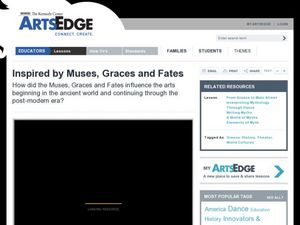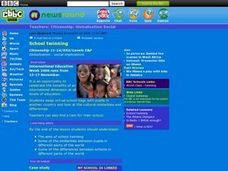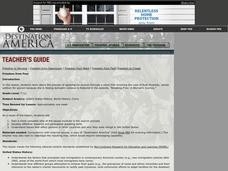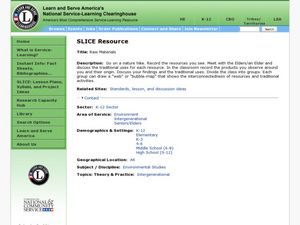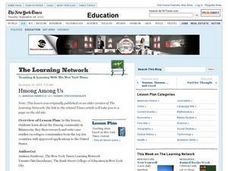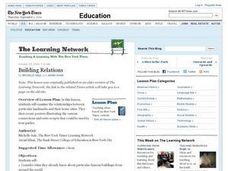Curated OER
A Troubled Relationship
Students discover information about Iran and Britain. In this current events lesson, students visit websites and listen to lectures to learn about Britain's Navy personnel that were taken hostage by Iran. Students investigate the history...
Curated OER
Inspired by Muses, Graces and Fates
Students examine how artists express the Muses through the arts. In this art and history lesson, students work cooperatively to identify the Greek Muses, Graces and the Fates. Students will identify the attributes of each, participate in...
Curated OER
New Ship For the Old World
Students explore the age of sailing in the colonies through role-playing. In groups, they play the role of a business owner, shipbuilder and geographer to complete specific tasks. They participate in an old World trade show to...
Curated OER
Local History
Students research the history of their own town. They post the findings in an iEARN on line forum. They practice research skills and gain an understanding of local history.
Curated OER
School twinning
Middle schoolers brainstorm the term school twinning. The teacher makes a class list of student's suggestions. Students are asked: Why do you think some schools form partnerships with schools from other countries? They then read the...
Curated OER
Freedom to Worship
Students investigate reasons why people sought freedom to worship in the United States and some of the difficulties and issues facing them in their immigration. As immigrants, they write letters to family members in the old country.
Curated OER
Trees-whiz
Students discover the importance of trees to the environment. After seeing trees in nature, they sketch various examples and collect all of them to create a book. In a journal, they develop questions they would want to ask a tree if it...
Curated OER
Raw Materials
Students participate in a nature hike and record the natural resources observed. They compare traditional and modern versions of everyday use items, and create graphic organizers that demonstrate the interconnectedness of resources.
Curated OER
Hmong Among Us
Students examine the Hmong community in Minnesota, then research and write case studies on refugee communities from the top ten countries with approved applications to the U.S. They write first-person stories from the perspective of...
Curated OER
Building Relations
Students examine the relationships between particular landmarks and their home cities. They create posters illustrating the various connections and write scripts that could be used by tour guides.
Curated OER
Peak Oil
Students explore the finite petroleum resources available and the surging demand for fossil fuels by developing nations. the need to reduce fossil fuel consumption and the development of alternative, sustainable fuels is examined in this...
Curated OER
Melodic Rhythms of India
Learners listen to and dance to the music of India. After listening to the music again, they identify the different types of instruments playing the melody. They explain the tabla tarang and view photographs of people performing the music.
Curated OER
Passport to the Eastern Hemisphere
Seventh graders create a time line of significant dates in the history of their nation. This requires students to examine the entire history of a country and make informed judgments based on their historical knowledge.
Curated OER
Can You Give Me Directions To the Game?
Learners become familiar with the use and capabilities of GIS and use it for research and mapping purposes. They heighten their ability to estimate travel times by incorporating distance, mode of travel and urban congestion into the...
Curated OER
Korea's Involvement in World War II Whose Point of View?
Young scholars research different points of view concerning Korea's involvement in World War II.
Curated OER
Seeing Is Believing
Students research and describe the stories of Thomas Jefferson, Meriwether Lewis and William Clark. They analyze historical sources from different points of view and present an analysis of two historical contexts.
Curated OER
Children of the World
Students examine case studies of students's lives in different societies around the world. They identify the roles and rights of students in different societies. They create a visual model of a child summarizing roles and rights.
Curated OER
Why Do Immigrants Come to the United States of America?
Students appreciate the diversity of motives for immigration to the United States. They gather first person data and develop a persuasive presentation. They create a historical comparison of the motives for immigration to the community.
Curated OER
Nepal in the Family
Young scholars consider the implications of travel to politically unstable regions. They establish criteria to determine risks and benefits and analyze the political unrest in Nepal following recent murders in the royal family.
Curated OER
Human Rights Squares
Students read the Universal Declaration of Human Rights (UDHR) and then participate in an activity in which they discuss instances where human rights have been violated.
Curated OER
Israel/Palestine and Saudi Arabia
Seventh graders examine governmental structures in place around the world. In this political systems lesson, 7th graders discuss components of a modern economy, and read two articles. Students answer questions after reading articles and...



